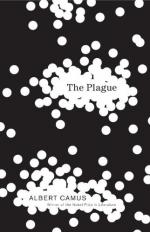|
|
The Plague Part 5
On a February morning, the gates of Oran are opened again. The separated lovers, like Rambert, wait for their reunion by train. There is celebration in the street among all classes, except of course those who return to find that loved ones did not survive the plague. The people are ready to forget the epidemic, and Rieux looks back to try and make sense of it all:
"Once plague had shut the gates of the town, they had settled down to a life of separation, debarred from the living warmth that gives forgetfulness of all." Part 5, pg. 298
He also realizes, thinking about Rambert's struggle:
"... if there is one thing one can always yearn for and sometimes attain, it is human love." Part 5, pg. 300
It is at this point that Dr. Rieux admits that he has been the narrator of the story. He has not revealed his identity because he wished to use the tone of an impartial observer. He hoped to side with the victims and share with them the feelings of "love, exile and suffering," which he believes they all shared in common.
Rieux's chronicle ends with the end of Cottard, a man who Rieux says has a "lonely heart." Grand and Rieux meet outside of Cottard's building, where they find the street has been blocked off because a crazy man is shooting down at the street from inside one of the buildings. The gunman injures a few people and kills a dog before the police are able to drag him out. Rieux and Grand then realize the gunman is Cottard.
It is the old asthma patient that leads Rieux to his last reflections in the novel. The patient seems embarrassed to learn of Tarrou's death, and goes on to say that 'plague' is just life, "no more than that." Rieux agrees with the old asthma patient, but believes that their endurance in the time of plague speaks to their ability to endure during normal times. Before ending the chronicle with the observation that the plague, while it can lie dormant for years, never really disappears, he wishes to state clearly:
"... what we learn in time of pestilence: that there are more things to admire in men than to despise." Part 5, pg. 308



